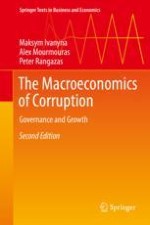
2021 | OriginalPaper | Buchkapitel
1. Introduction
verfasst von : Maksym Ivanyna, Alex Mourmouras, Peter Rangazas
Erschienen in: The Macroeconomics of Corruption
Aktivieren Sie unsere intelligente Suche, um passende Fachinhalte oder Patente zu finden.
Wählen Sie Textabschnitte aus um mit Künstlicher Intelligenz passenden Patente zu finden. powered by
Markieren Sie Textabschnitte, um KI-gestützt weitere passende Inhalte zu finden. powered by